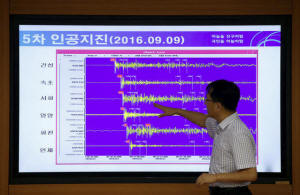|
Too big to fail: China maps out its Trump
strategy
 Send a link to a friend
Send a link to a friend
 [December 14, 2016]
By Ben Blanchard and Christian Shepherd [December 14, 2016]
By Ben Blanchard and Christian Shepherd
BEIJING (Reuters) - When Donald Trump
becomes U.S. president next month, one issue above all others could
force his new administration to work closely with China and underscore
why he and Beijing need each other - North Korea.
A nuclear armed North Korea, developing missiles that could hit the U.S.
west coast, is clearly bad news for Washington but also Pyongyang's
sometimes-reluctant ally Beijing, which fears one day those missiles
could be aimed at them.
"There is enormous space for the two countries to cooperate on North
Korea. The two must cooperate here. If they don't, then there will be no
resolution to the North Korean nuclear issue," said Ruan Zongze, a
former Chinese diplomat now with the China Institute of International
Studies, a think-tank affiliated with the Foreign Ministry.
"It's no good the United States saying China has to do more. Both have
common interests they need to pursue, and both can do more," he added.
North Korea is a tricky proposition even at the best of times for China,
and simply easing up on U.N. sanctions as a way to express displeasure
at Trump's foreign policies could backfire badly for China, said one
China-based Asian diplomat.
"They can't really do that without causing themselves problems," the
diplomat added, pointing to China's desire to denuclearize the Korean
peninsula.

TAIWAN TENSION
From North Korea to Iran to a closely entwined business relationship
worth $598 billion in 2015, the two countries have broad common
interests, and China expects Trump to understand that.
While China was angered by Trump's call this month with Taiwan President
Tsai Ing-wen, and then casting doubt over the future of the "one China"
policy under which the U.S. recognizes Taiwan as being part of China, it
was also quite restrained, said a senior Beijing-based Western diplomat
"China's game now is to influence him and not antagonize him," he said,
speaking on condition of anonymity.
China believes the two countries need each other, and as Trump is a
businessman he understands that, the People's Daily's wrote last month.
"The importance of the China-U.S. relationship goes without saying, and
can be said to be too big to fail," the communist party mouthpiece wrote
in a commentary.
China also expects a transactional relationship with the deal-making
Trump, especially on trade, even if for Beijing Taiwan is completely off
limits for negotiation.
"Trump is a businessman. He wants a deal," a source with ties to the
Chinese leadership told Reuters, requesting anonymity. "He wants the
biggest benefit at the smallest cost."
On the campaign trail, Trump threatened punitive tariffs on China, and
has recently repeated his criticism of Chinese trade policy, dovetailing
with his Taiwan comments.
"This is provocation, but war is unlikely," a second Chinese source with
leadership ties said of Trump's Taiwan moves.
"The Chinese side will not easily yield," the source said. "We expect
tensions."
[to top of second column] |

Ryoo Yong-gyu, Earthquake and Volcano Monitoring Division Director,
points at a chart showing seismic waves observed in South Korea,
during a media briefing at Korea Meteorological Administration in
Seoul, South Korea, September 9, 2016. REUTERS/Kim Hong-Ji/File
Photo

TRADE INTERESTS
Wang Huiyao, head of the Centre for China and Globalisation and a
government adviser, said China should invite the United States to
join the Beijing-lead Asian Infrastructure Investment Bank.
"He will pursue U.S. interests and to do so he cannot ignore the
huge benefits that come from China-U.S. trade relations," Wang said.
The Asian diplomat said some Chinese officials had expressed
"euphoria" at Trump's election, believing it marked the end of U.S.
dominance in the world and represented China's chance to seized the
initiative.
But Trump's unexpected move to put the Taiwan issue center stage in
relations with China had put an end to that.
"They're not as happy now," he said.
To be sure, there are voices in China seeing opportunity in a Trump
presidency.
Huo Jianguo, former head a trade policy body under China's Commerce
Ministry, said Trump is likely to reduce the United States'
engagement with the world, presenting an opening for China.
"Under Obama, China-U.S. relations had already deteriorated to their
worst possible level. Trump will not continue to ratchet up what
were clearly ideological attempts to suppress China," Huo said.
"China should not seek to immediately take the lead in global
governance. They should first lead RCEP to become successful, then
from here China's global influence can take root," Huo said,
referring to a Southeast Asian-backed free trade deal China has
championed.
Even the Global Times, an influential and normally stridently
nationalistic tabloid, has sought to temper expectations on how
China could use a Trump presidency to its advantage.

"China still cannot match the U.S. in terms of comprehensive
strength," it said in an editorial. "It has no ability to lead the
world in an overall way, plus, neither the world nor China is
psychologically ready for it. It's beyond imagination to think that
China could replace the U.S. to lead the world."
(Additional reporting by Benjamin Kang Lim; Editing by Lincoln
Feast)
[© 2016 Thomson Reuters. All rights
reserved.]
Copyright 2016 Reuters. All rights reserved. This material may not be published,
broadcast, rewritten or redistributed. |